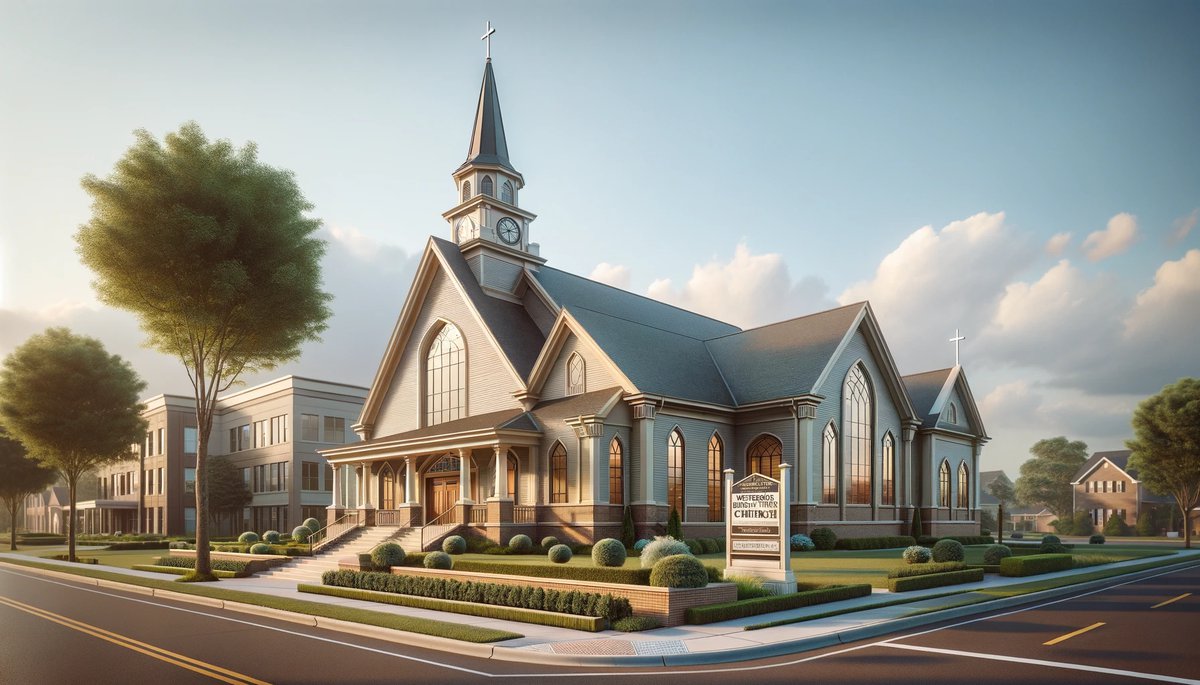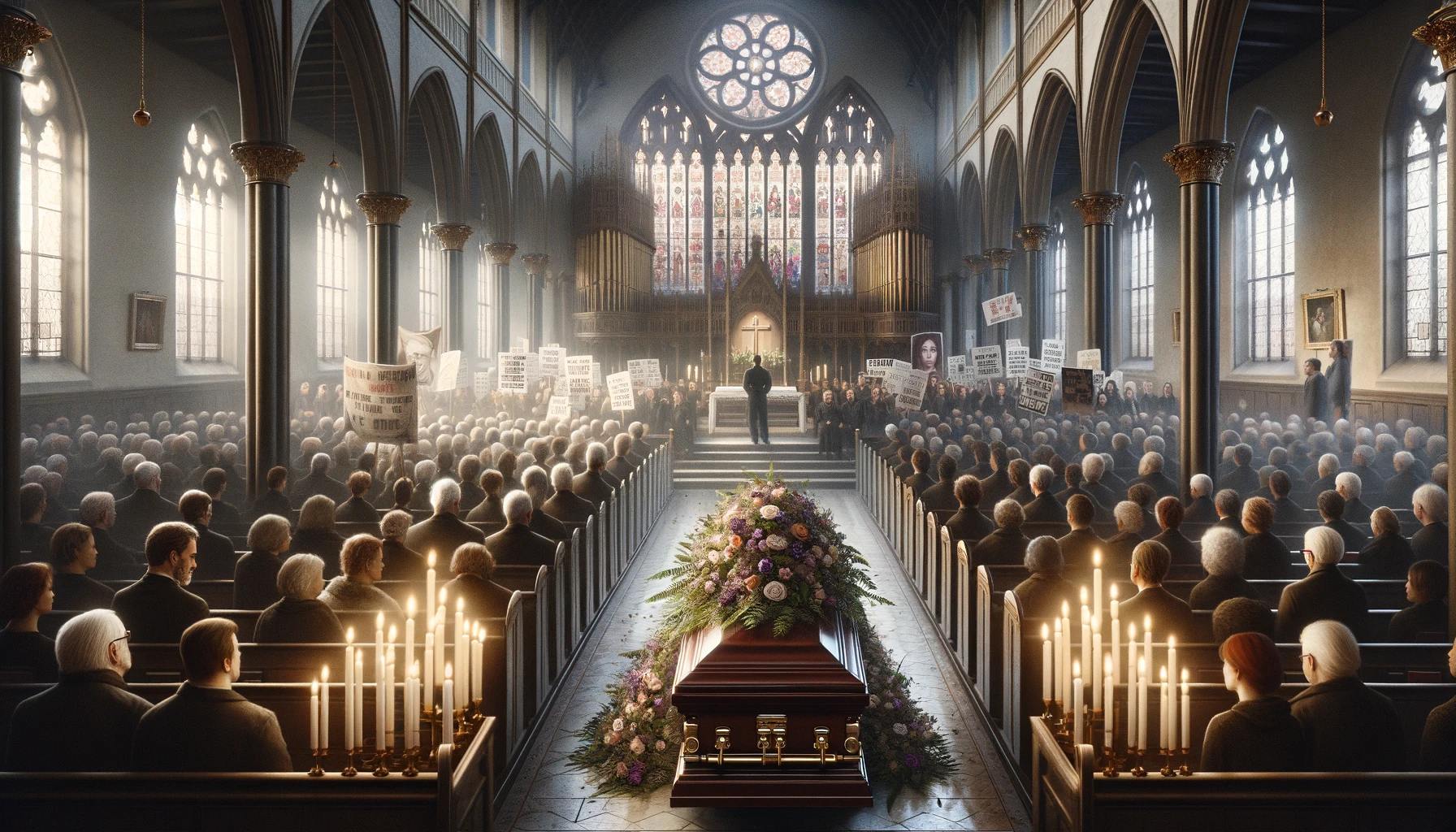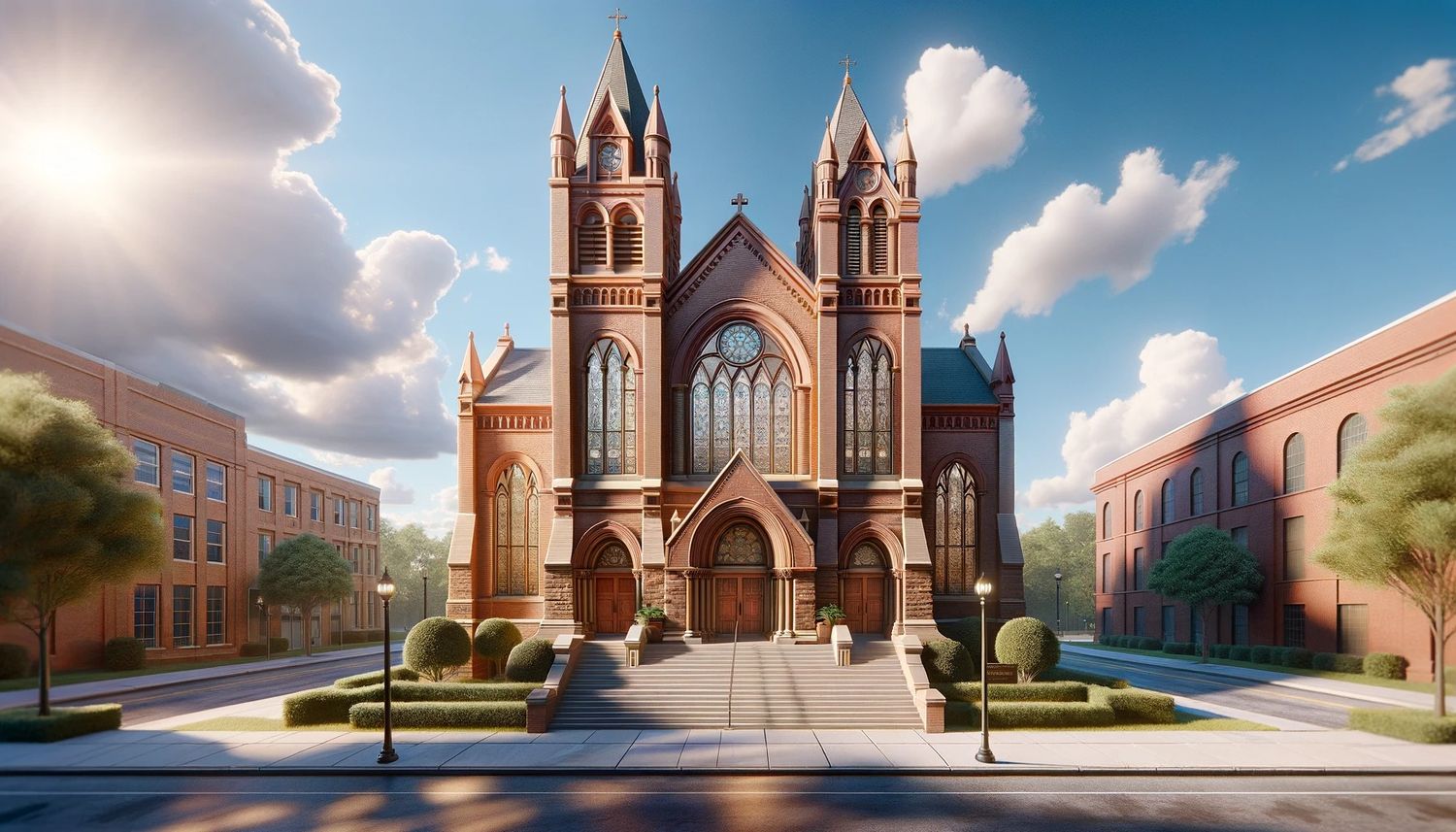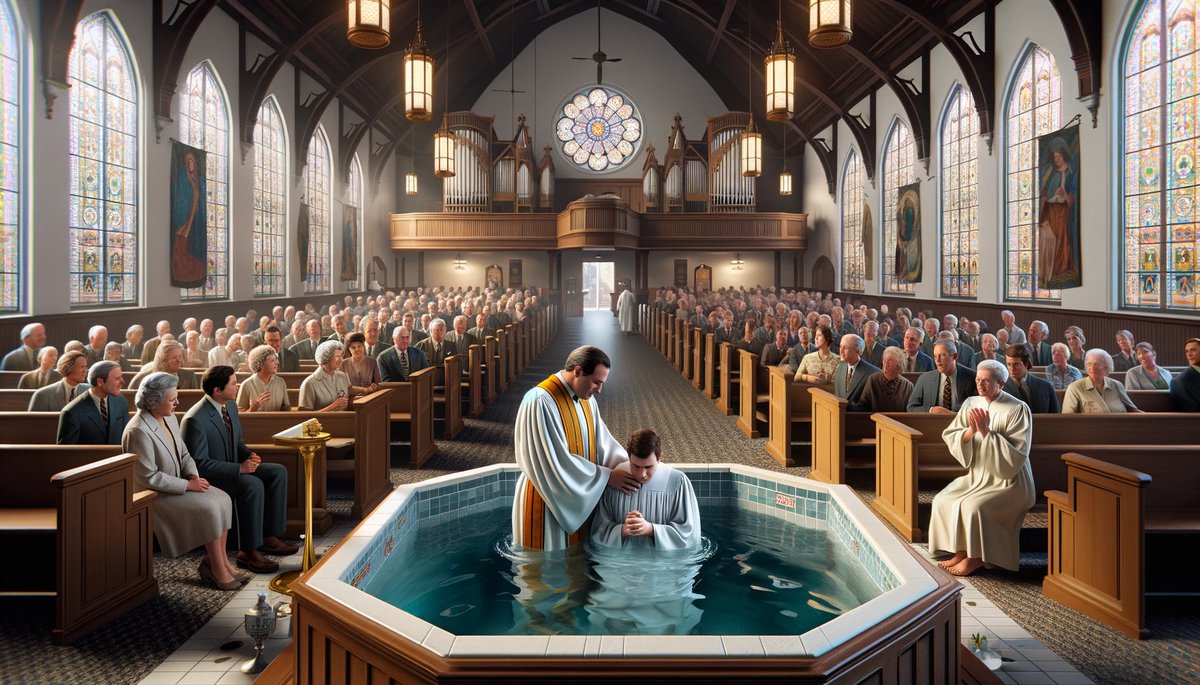Home>Theology and Spirituality>Where Does The Westboro Baptist Church Get Their Money


Theology and Spirituality
Where Does The Westboro Baptist Church Get Their Money
Published: February 20, 2024
Ericka Andersen, an editor at Christian.net, expertly merges digital strategy with content creation, focusing on faith and societal issues. Her communication skills enhance the platform's engaging narratives, fostering meaningful dialogue on belief's impact on society.
Discover the financial sources of the Westboro Baptist Church and how they fund their activities. Explore the intersection of theology and spirituality in their fundraising efforts.
(Many of the links in this article redirect to a specific reviewed product. Your purchase of these products through affiliate links helps to generate commission for Christian.net, at no extra cost. Learn more)
Table of Contents
Introduction
The Westboro Baptist Church, known for its controversial and inflammatory protests, has sparked widespread curiosity about the source of its funding. This religious organization, based in Topeka, Kansas, has gained notoriety for its vehement opposition to homosexuality, as well as its picketing of military funerals and other high-profile events. Despite its small size, the church has managed to sustain its activities and legal battles over the years, prompting questions about the origins of its financial resources.
In the following sections, we will delve into the history of the Westboro Baptist Church, exploring its founding principles and the factors that have contributed to its notoriety. Additionally, we will examine the various sources of income that have enabled the church to maintain its operations and legal endeavors. By shedding light on these aspects, we can gain a deeper understanding of the dynamics at play within this controversial religious institution.
History of the Westboro Baptist Church
The Westboro Baptist Church was established in 1955 by Fred Phelps, a former civil rights attorney. Initially, the church operated within mainstream Christian beliefs, but it gradually diverged into a more extreme and controversial direction. The church's fundamentalist ideology centers on the belief that America's tolerance of homosexuality is the primary cause of its perceived moral decay. This viewpoint has led to the church's notoriety for its vehement anti-LGBTQ+ stance, which is prominently displayed in its provocative protests and inflammatory rhetoric.
Under the leadership of Fred Phelps, the church gained attention for its confrontational approach to spreading its message. The congregation, consisting largely of Phelps' extended family members, became known for picketing high-profile events, including military funerals and public gatherings, with signs bearing incendiary slogans. This aggressive and attention-grabbing strategy garnered widespread media coverage and sparked public outrage, further amplifying the church's visibility.
Over time, the Westboro Baptist Church's activities have been met with legal challenges and opposition from various groups and individuals. Despite facing numerous lawsuits and public condemnation, the church has remained steadfast in its beliefs and continued its provocative demonstrations. This unwavering commitment to its controversial mission has solidified the church's position as a polarizing and divisive entity within the religious landscape.
As the church's notoriety grew, it became the subject of intense scrutiny and debate, with many questioning the motivations and underlying principles of its actions. The history of the Westboro Baptist Church is marked by a persistent and unyielding pursuit of its extreme ideology, which has left a lasting impact on public discourse surrounding issues of free speech, religious freedom, and LGBTQ+ rights.
The evolution of the Westboro Baptist Church reflects a complex interplay of religious fervor, legal battles, and societal backlash. Understanding the historical trajectory of the church is essential for comprehending its present-day influence and the factors that have contributed to its financial sustainability and continued operations.
Sources of Income for the Westboro Baptist Church
The Westboro Baptist Church, despite its relatively small size and controversial reputation, has managed to sustain its activities and legal battles over the years. The question of where the church obtains its funding has been a subject of widespread curiosity and speculation. Understanding the sources of income for the Westboro Baptist Church sheds light on the financial mechanisms that enable its operations and controversial activities.
Donations and Support from Members
One of the primary sources of income for the Westboro Baptist Church is donations from its members and supporters. The church, comprised largely of Fred Phelps' extended family, relies on the financial contributions of its congregation to fund its activities. The fervent dedication of its members to the church's extreme ideology translates into financial support, enabling the church to sustain its provocative protests and legal endeavors. The unwavering commitment of its members to the church's cause has played a crucial role in ensuring its financial viability.
Legal Settlements and Lawsuits
The Westboro Baptist Church has been involved in numerous legal battles and lawsuits, often as a result of its controversial demonstrations and inflammatory rhetoric. Surprisingly, these legal entanglements have also served as a source of income for the church. In some cases, the church has received monetary settlements resulting from lawsuits, which have contributed to its financial sustenance. While these legal disputes have garnered negative attention, they have also provided the church with financial resources to continue its operations.
Media and Publicity
The church's provocative protests and inflammatory messaging have garnered widespread media coverage and public attention. This visibility has, in turn, translated into financial support for the church. While the media coverage has often portrayed the church in a negative light, it has also amplified its message and attracted support from individuals who align with its extreme beliefs. This heightened visibility has facilitated the flow of financial contributions from sympathizers, further bolstering the church's financial resources.
The sources of income for the Westboro Baptist Church reflect a complex interplay of member donations, legal settlements, and the impact of media coverage. These factors have collectively contributed to the church's financial sustainability, enabling it to perpetuate its controversial activities and legal battles. By understanding these sources of income, we can gain insight into the dynamics that underpin the church's continued operations and its ability to sustain its extreme mission.
Donations and Support from Members
The Westboro Baptist Church relies significantly on the financial contributions and unwavering support of its members to sustain its operations and further its controversial mission. The church, predominantly composed of Fred Phelps' extended family members, has cultivated a fervent and dedicated congregation that aligns closely with its extreme ideology. This alignment translates into substantial financial backing, enabling the church to perpetuate its provocative protests and legal endeavors.
The members of the Westboro Baptist Church are deeply committed to the church's fundamentalist beliefs, particularly its vehement opposition to homosexuality. This fervor is reflected in their willingness to provide financial support, often through regular donations and contributions. The church's ability to mobilize its members to contribute financially is a testament to the strength of its internal community and the depth of their dedication to its controversial cause.
The financial support from members plays a pivotal role in sustaining the church's activities, including the organization of provocative demonstrations and legal battles. These contributions serve as a lifeline for the church, providing the necessary resources to fund its operations and advance its extreme agenda. The church's ability to garner such unwavering support from its members underscores the depth of their commitment to its cause and their willingness to invest in furthering its controversial mission.
Furthermore, the church's reliance on member donations fosters a sense of collective responsibility and ownership among its congregation. By contributing financially, members actively participate in advancing the church's agenda, reinforcing their dedication to its extreme beliefs. This financial symbiosis between the church and its members solidifies their shared commitment and ensures the continuity of the church's provocative activities.
In essence, the Westboro Baptist Church's financial sustainability is intricately linked to the unwavering support and financial contributions of its members. This internal solidarity and financial backing enable the church to perpetuate its controversial demonstrations and legal battles, underscoring the pivotal role of its congregation in sustaining its extreme mission. The church's ability to mobilize its members for financial support reflects the depth of their dedication and the integral role they play in advancing its provocative agenda.
Legal Settlements and Lawsuits
The Westboro Baptist Church has been embroiled in numerous legal battles and lawsuits, often stemming from its controversial demonstrations and inflammatory rhetoric. Surprisingly, these legal entanglements have also served as a source of income for the church, contributing to its financial sustenance.
In several instances, the church has been involved in legal disputes that have resulted in monetary settlements. These settlements, while attracting negative attention and public scrutiny, have provided the church with significant financial resources. The controversial nature of the church's activities has led to legal confrontations, some of which have culminated in settlements that bolstered its financial standing.
The monetary gains from legal settlements have played a crucial role in enabling the Westboro Baptist Church to continue its operations and pursue its extreme mission. Despite the contentious nature of these legal disputes, the resulting financial resources have provided the church with the means to sustain its activities, including provocative protests and legal endeavors.
Moreover, the legal battles and lawsuits have inadvertently contributed to the church's visibility and public awareness. The media coverage surrounding these legal confrontations has amplified the church's message and attracted support from individuals who align with its extreme beliefs. This heightened visibility has, in turn, facilitated the flow of financial contributions from sympathizers, further bolstering the church's financial resources.
The interplay between legal settlements, lawsuits, and the resulting media coverage has created a complex dynamic that has both sustained the church's financial viability and amplified its message. While the church's legal entanglements have been met with widespread criticism, they have also yielded financial gains that have supported its controversial activities.
In essence, the Westboro Baptist Church has leveraged legal settlements and lawsuits as a means of bolstering its financial resources, enabling it to perpetuate its extreme mission. The monetary gains resulting from these legal disputes have played a pivotal role in sustaining the church's operations and furthering its provocative demonstrations, underscoring the multifaceted impact of its legal engagements on its financial sustainability.
Media and Publicity
The Westboro Baptist Church's provocative protests and inflammatory messaging have garnered widespread media coverage and public attention, contributing to its financial sustenance. Despite the predominantly negative portrayal in the media, the church has leveraged its controversial activities to attract attention and support from individuals who align with its extreme beliefs.
The media coverage surrounding the church's demonstrations and confrontational rhetoric has served as a double-edged sword, amplifying its message while also eliciting public outrage. This heightened visibility has translated into financial support from sympathizers who share the church's fervent opposition to homosexuality and its uncompromising stance on moral issues.
Moreover, the media's portrayal of the church's activities has sparked intense public debate and scrutiny, further amplifying its presence in the public consciousness. This increased visibility has facilitated the flow of financial contributions from individuals who endorse the church's extreme ideology, bolstering its financial resources.
The church's ability to harness media attention, despite the predominantly negative portrayal, underscores its adeptness at leveraging controversy to further its agenda. While the media coverage has often depicted the church in an unfavorable light, it has also provided a platform for disseminating its message and attracting support from like-minded individuals.
In essence, the Westboro Baptist Church has capitalized on media coverage and publicity to garner financial support from individuals sympathetic to its extreme beliefs. The heightened visibility resulting from media attention has contributed to the flow of financial contributions, bolstering the church's financial resources and enabling it to perpetuate its controversial activities.
The interplay between media coverage, public attention, and financial support has been instrumental in sustaining the church's operations and advancing its provocative mission. Despite the polarizing nature of its activities, the church has adeptly utilized media and publicity to bolster its financial sustainability, underscoring the multifaceted impact of media coverage on its operations and controversial endeavors.
Read more: Why The Westboro Baptist Church Protests
Conclusion
In conclusion, the Westboro Baptist Church's financial sustainability is underpinned by a complex interplay of member donations, legal settlements, and the impact of media coverage. The unwavering support and financial contributions from its members, predominantly comprised of Fred Phelps' extended family, play a pivotal role in sustaining the church's extreme mission. The dedication of its congregation to the church's controversial cause has translated into substantial financial backing, enabling the perpetuation of provocative protests and legal endeavors.
Furthermore, the church has leveraged legal settlements resulting from numerous legal battles and lawsuits to bolster its financial resources. Despite the contentious nature of these legal disputes, the resulting monetary gains have provided the means to sustain its activities and pursue its extreme agenda. The interplay between legal settlements, lawsuits, and the resulting media coverage has created a dynamic that has both sustained the church's financial viability and amplified its message.
The church's adeptness at leveraging media coverage and publicity, despite the predominantly negative portrayal, has facilitated the flow of financial contributions from individuals sympathetic to its extreme beliefs. The heightened visibility resulting from media attention has contributed to the church's financial sustenance, enabling it to perpetuate its controversial activities and legal battles.
Overall, the Westboro Baptist Church's financial sustainability is intricately linked to the unwavering support and financial contributions of its members, the monetary gains from legal settlements, and the impact of media coverage. These factors collectively contribute to the church's ability to sustain its extreme mission, perpetuate its controversial activities, and navigate legal challenges. By understanding the sources of income that underpin the church's operations, we gain insight into the dynamics that have enabled its continued presence and influence within the religious landscape.













